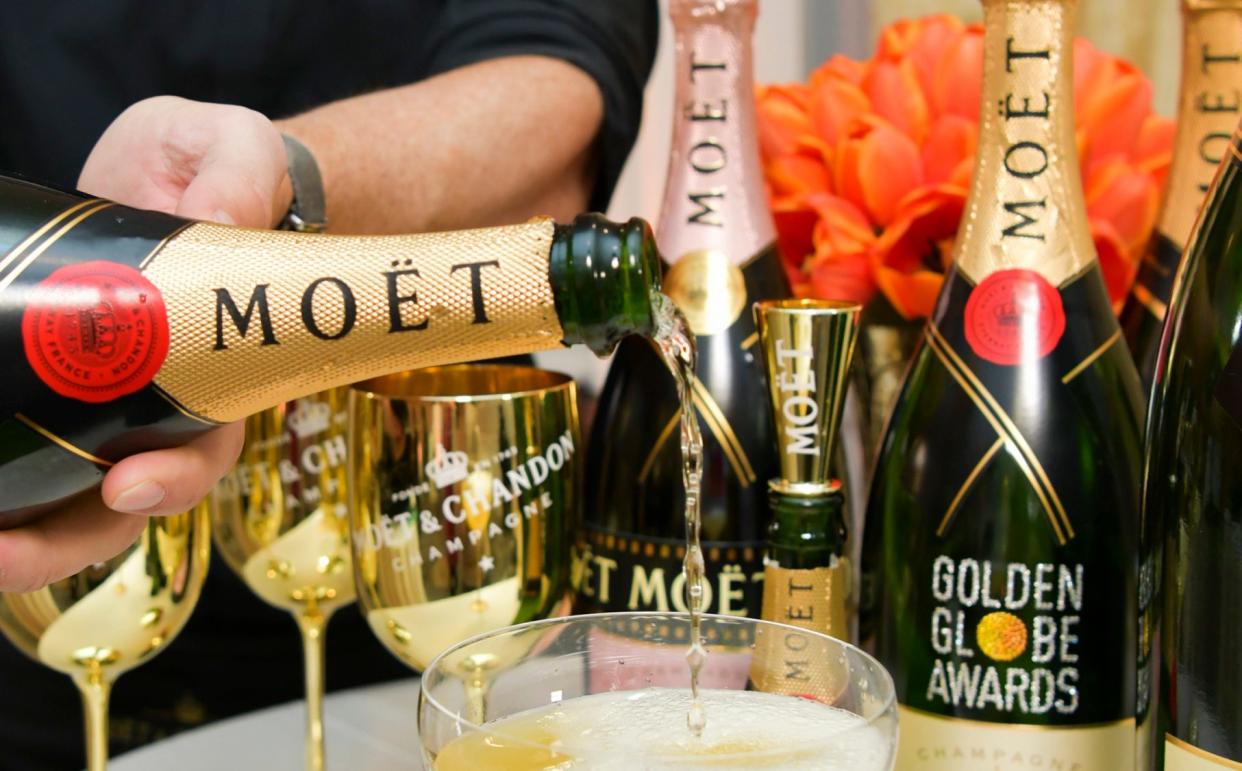Chinese challenger threatens to burst Moet & Chandon’s bubble

The world’s biggest wine brand Moët & Chandon is at risk of losing its crown to Asian challenger Changyu.
The leading champagne brand’s value fell 10pc to $1.3bn (£1bn) between 2022 and 2023, meaning it only narrowly beat the Chinese winemaker, which had a valuation of $1.2bn (£946m).
The French champagne house, founded in 1743, has held the top spot in the Brand Finance champagne and wine rankings for three years, achieving a valuation of $1.4bn (£1.1bn) in 2022 and $1.2bn (£946m) in 2021.
Luxury firm LVMH, which owns champagne houses Moët & Chandon and Veuve Clicquot alongside other brands including Louis Vuitton, reported in October that its wine and spirits revenue had fallen 14 per cent between July and September.
The results signalled the end of the post-pandemic boom in luxury goods, which had seen the company become the first in Europe to reach a £500 billion valuation earlier this year.
The Chinese Changyu Pioneer Wine Company, which remains relatively unknown in the West, has seen dramatic growth, increasing its value by a third between 2022 and 2023.
It stormed into the international market following the acquisition of 15th-generation Austrian winemaker Lenz Moser in 2013, when it launched its Chateau Changyu Moser XV collaboration.
The oldest wine producer in China, founded in 1892, Changyu’s cabernet sauvignon and white cabernet are sold in Selfridges, and on online supermarket Ocado.
The company has developed more than 20,000 hectares of vineyards across China, more than ten times the number of Moët & Chandon, which has 1,190 hectares.
Some of the producer’s vineyards are understood to be in Shanxi province, north China.
Chinese consumers have been drinking more across the board and are set to overtake American drinkers for per capita consumption by the end of the decade.
By 2030, more than half of adults across the world will drink alcohol, with a quarter binge drinking once a month, research from The Lancet in 2019 found.
But wine consumption in China continues to pale in comparison with Baijiu, an ancient drink which is the world’s most popular spirit.
Matt Small, of wine investment company Cru Wine, said the Chinese market could be crucial to the reboot of the champagne industry.
“There’s a massive potential growth industry there, which could happen over the next ten years. We have seen China do the same with Burgundy. Before they were predominantly Bordeaux, then they started demanding Burgundy and now they’re one of the biggest Burgundy purchasers in the world,” he said.

Mr Small said the increase in younger drinkers demanding higher-end champagnes was helping to keep the price of fine wine up.
He said: “Millennials and Gen Zs are demanding higher and higher quality than the baby boomers did before. So it’s not just high-net-worth individuals these days who are drinking the top, top champagnes.”
Robert Haigh, strategy director at Brand Finance, said champagne prices have increased due to poor yields at harvest and rising operational costs, leading consumers to turn to more affordable options.
Mr Haigh said: “LVMH, whose champagne houses include Moët & Chandon and Veuve Clicquot, reported its lowest share price of 2023 in October.
“Although it is possible this signifies a return to pre-COVID normality, these brands must now look to mitigate declining investor sentiment as a result of knocked share prices.”
Moët & Chandon’s wobble comes after more than 60pc of drinkers chose Lidl’s £14.99 Montaudon Champagne over the famous brand’s Imperial Brut in a blind taste test.

The supermarket’s “Chateaux Noir” events in London, Glasgow and Liverpool, held blind-tasting sessions where customers tried sparkling wines in a darkened room.
Richard Bampfield, Lidl’s master of wine in Britain, said drinkers had chosen the cheaper supermarket wine for its “luxurious feel and rich flavour”.
He said: “There’s nothing like a blind-tasting to concentrate the senses, even more so when it comes to sampling drinks.”
The Daily Telegraph has approached LVMH for comment.
Recommended
‘I’m an etiquette expert, and this is the polite way you split the bill’

 Yahoo News
Yahoo News 
